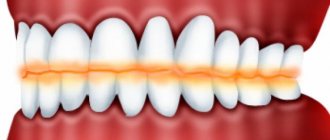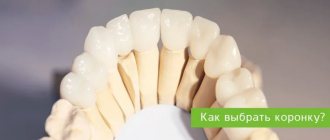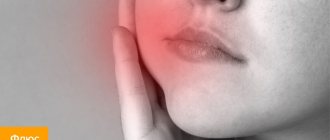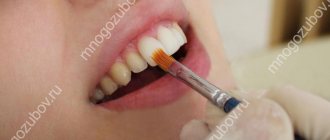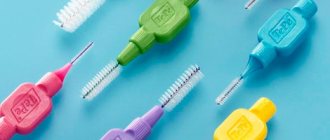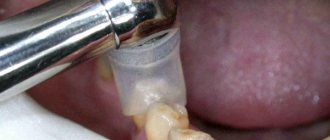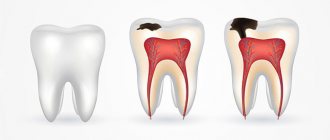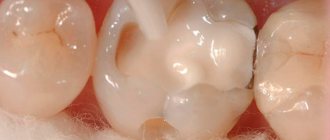Many people experience toothache in their lives. If caries is observed or you can even notice a hole, then the reason for such discomfort is clear. But there are times when teeth begin to ache for no apparent reason at first glance. In this case, neither the presence of caries nor any visible damage can be noticed on the surface of the diseased tooth.
Such pain without a reason can be of different types. In some cases, the patient experiences discomfort only at the moment when any food, especially hard food, comes into contact with the tooth. But in some cases, toothache can be sharp and unbearable, often appearing in the dark, preventing a person from falling asleep.
Upper front tooth hurts
Regardless of the nature of the pain, it is impossible to ignore them and let the pathology take its course. If you experience toothaches, it is very important to consult a specialist as early as possible. Only a qualified dentist will help identify the real cause of toothaches, as well as prescribe effective treatment that will help relieve the patient of discomfort in the shortest possible time and return him to normal life.
What is special about incisors?
Incisors are front teeth that have distinctive structural features, which in turn can affect the occurrence of pain and various dental pathologies. The fact is that these teeth are located in the oral cavity very tightly to each other, which makes the spaces between them very narrow. That is why it is necessary to carefully monitor the cleanliness of your front teeth.
Important ! In order to properly clean the front teeth, it is necessary to use special dental floss, since a regular toothbrush is not able to rid the narrow spaces between the teeth of food debris and bacteria.
Incisor position
It also very often happens that the patient does not pay attention to the occurrence and spread of caries on his teeth. This happens due to the fact that the inside of the incisors is not visible to humans and in everyday life people very rarely pay attention to this side of the teeth. But in vain, because often it is on the back surface of the incisors that caries begins to arise, which is the cause of tooth pain. In order not to miss the moment and stop the spread of caries in time, it is necessary to perform regular preventive examinations at the dentist.
Also, due to their structural features, the front teeth are more often subject to various injuries, chips, and cracks. This happens because the incisors are much thinner in structure than the teeth located in the back of the mouth, and also because many injuries or impacts very often occur in this area, for example, during sports or in fights.
Important! Incisors have thinner dentin, as well as thinner enamel - this is precisely the consequence of the greater susceptibility of incisors to caries, since it is much easier for bacteria to penetrate the tooth.
Incisors are more susceptible to various pathologies
The front teeth also have a certain aesthetic feature, since their health can be appreciated by anyone. That is why the occurrence of various diseases on the surface of the front teeth very often creates severe psychological discomfort when a person is forced to communicate with other people.
Classification of disease prevalence
With local abrasion, only individual teeth are affected - as a rule, against the background of some acquired factors; with generalized abrasion, this problem already affects the entire dentition, and such an anomaly is usually congenital.
Symptoms of increased tooth wear
- the appearance of tooth enamel changes, it becomes uneven, rough, and tubercles appear on it;
- the natural color of the teeth changes, they become almost translucent;
- teeth acquire increased sensitivity to the effects of cold and heat, to mechanical or chemical irritants;
- sharp edges form on the enamel, which can injure the mucous membrane on the inner surface of the lips and cheeks;
- the teeth are shortened, the lower third of the face decreases in size, and folds appear in the corners of the mouth;
- hearing loss occurs and the chewing process is disrupted.
Why do my incisors hurt?
Pain can occur when a person has had some kind of injury in the facial area. If he has suffered a bruise or blow due to some traumatic situation or while playing sports, this may result in pain in the front teeth. In this case, the etiology of toothache is clear. But what to do when your teeth start to hurt for no apparent reason?
The upper front teeth may hurt due to injury
In fact, there are a huge number of factors that can cause tooth pain. Here are the most common reasons.
- How long does it take for drugs to leave the body?
- Plaque begins to deposit near the base of the teeth. If it is not removed on time with professional cleaning from a specialist, then it gradually begins to turn into tartar, which is much more difficult to get rid of. Tartar gradually begins to irritate the adjacent tooth and gum tissues - because of this, the patient begins to notice pain.
- Pain may be felt due to the occurrence of cervical caries in the initial stages of development. It is almost impossible to notice any changes on the surface of the tooth with the naked eye. At the initial stage of the disease, there may be no darkening of the enamel or holes in the tooth. But the beginning changes can still be noticed: small whitish spots, similar to stains, are found on the enamel. This phenomenon indicates that the tooth enamel begins to gradually oxidize.
- The cause of tooth pain can be inflammation of the gums: for example, gingivitis, periodontal disease or stomatitis. Accordingly, in the presence of inflammation, the pain syndrome extends not only to the gums, but also to the teeth. In this case, a person may notice pain while brushing their teeth, as well as while eating.
Pain may occur due to gum inflammation
- The disease can develop on the back tooth, but pain often spreads to the front teeth through irradiation. This phenomenon occurs quite often. In this case, pain can radiate not only to healthy teeth, but also to other nearby tissues - for example, in the temples, neck and even the back of the head.
- In some cases, tooth enamel may become thinner for various reasons. The bones of the teeth themselves also become thinner over time. The causes of this process can be endocrine diseases, nervous system disorders, pathologies of the digestive tract, recent various infectious diseases, and even pregnancy and breastfeeding.
Pain may be felt due to thinning tooth enamel
You need to know that pain in the front teeth often appears as a result of undergoing some severe stressful situations. Discomfort can also occur due to psychological fatigue or prolonged physical and mental stress. Various situations that make a person very nervous can lead to toothache. In this case, it is comparable to a headache that appears after stress occurs.
Diagnostics
Determining the causes of a symptom is the responsibility of the dentist. Patients may need to be seen by an ENT doctor and an oral and maxillofacial surgeon. Consultations with a neurologist, traumatologist or rheumatologist are less often indicated. The doctor collects complaints, examines the dynamics of the development of the disease, finds out possible provoking factors, establishes the nature of pain, their relationship with the time of day, food intake, and other circumstances.
Based on the survey data, general and dental examination, a diagnostic action plan is drawn up, which may include the following procedures:
- Radiography.
X-ray examination of the upper jaw is used to detect tumors, purulent bone lesions, traumatic injuries, and dental diseases. For sinusitis, X-rays of the paranasal sinuses are performed, and for mastoiditis, images of the temporal bone are taken. - Other imaging techniques
. and MRI are used at the final stage of the examination when radiographic data are ambiguous, to detail the changes identified on the X-rays. They allow you to accurately determine the location and extent of lesions in neoplasms, injuries, purulent inflammation, and other pathological processes. - Otolaryngological techniques
. Along with radiography and CT, anterior rhinoscopy, probing of the maxillary sinus, and diagnostic puncture of the sinus are used in the diagnosis of odontogenic sinusitis. If mastoiditis is suspected, otoscopy, hearing testing with tuning forks, and audiometry are performed. - Punctures, biopsies
. For deep perimaxillary phlegmon, a non-palpable area of fluctuation, puncture of the pathological focus is recommended. Enlarged lymph nodes against the background of space-occupying formations are an indication for a biopsy to exclude lymphatic metastases. - Lab tests
. During inflammatory processes, a general blood test reveals an increase in ESR, leukocytosis, and a shift in the leukocyte formula to the left. Examination of purulent discharge allows us to identify the causative agent of the process and determine antibiotic sensitivity. Histological or cytological analysis makes it possible to establish the type of neoplasm and differentiate between malignant and benign tumors.
Treatment planning
What to do if your teeth hurt?
Treatment for toothache can only be prescribed by a specialist only after all the necessary research has been carried out and the cause of the pain syndrome has been identified.
If the pain appears due to the appearance of tartar on the tooth, in this case the latter is simply removed. Today, this procedure is one of the simplest in dentistry, and thanks to modern equipment, it is also painless. Deposits on the surface of the tooth are removed using a special device that cleans its surface by injecting a stream of water with strong pressure.
Important! Very often, this procedure is carried out not only with the help of plain water: various substances and microelements are added to it, which will help not only quickly clear the tooth of stone, but also protect and strengthen the tooth enamel.
If the cause of the pain is tartar, it is removed
For more severe and extensive tartar deposits, ultrasonic removal is most often used.
These procedures are currently very popular, because they allow the patient to be relieved not only of any visible dental damage, restoring their aesthetic appearance, but also of pain that could have bothered the person for a long time.
But you need to remember that a little pain after the procedure is absolutely normal and will go away in the near future. It occurs due to the fact that teeth and gums are subjected to mechanical stress during the procedure. To eliminate pain in the near future, you must follow all the doctor’s recommendations, as well as standard hygiene rules. This will also allow the patient to prevent any complications, which, although a rare occurrence, can occur in those people who neglect the advice of the dentist.
Some pain may be felt after the procedure
Also, to prevent the resumption of tartar deposits, the patient must take preventive measures: for example, brushing the teeth not only with a toothbrush, but also with dental floss.
Important! All preventive measures should be explained to the patient by a specialist.
If, after carrying out all the necessary studies, the doctor diagnoses the presence of cervical caries, then in this case it is necessary to begin its therapy immediately. Treatment of this pathology occurs through minor surgery under local anesthesia.
Treatment of cervical caries
After the initial treatment of cervical caries, the patient is recommended to carefully monitor oral hygiene, as well as review his lifestyle and diet, and, if possible, stop drinking alcoholic beverages and smoking.
- Treatment of cystitis in women and men. How to properly treat cystitis?
For gum inflammation, the best therapy is to rinse the mouth with various natural remedies and herbal decoctions. Rinsing can also be carried out with other substances, for example, soda, hydrogen peroxide or potassium permanganate. Experts also recommend that patients who refuse to make the medicine at home, find a mouthwash with chlorhexidine at the pharmacy - this is the component that will help heal sore gums and stop the process of their destruction. Mouth rinses containing chlorhexidine are good because they can be used even during pregnancy or breastfeeding.
Inflammation of the gums is best treated with mouth rinse
Important! To treat gum inflammation in young children, the doctor prescribes a special homemade mash. In addition, a course of medications is prescribed to increase the child’s immunity.
Periodontal disease is a more serious disease, since it causes not only inflammation of the gums, but also their detachment and destruction. With this process, the body of the tooth begins to gradually become exposed, and ultimately the tooth falls out, as the gums become unable to hold it tightly.
If you do not consult a doctor in time and do not stop the process of gum destruction, then the patient may soon lose all his teeth. Periodontal disease has many causes and never develops on its own. Most often, the reason for its development is the presence of pathologies of the gastrointestinal tract or lack of iron in the body. That is why treatment of periodontal disease must be selected individually for each patient, based on its underlying causes.
It is important to start treating periodontal disease on time
If the pain in the upper front tooth is the result of irradiation from another affected tooth, then during an examination by a specialist it is necessary to identify the latter. Only in this case, with the necessary treatment, will the patient be able to get rid of pain. It often happens that a wisdom tooth that has grown incorrectly “gives” pain. In this case, it must be removed, but you should not be afraid of this procedure. Wisdom tooth extraction is performed under local anesthesia, and the recovery period after it is no different from recovery after the extraction of any other tooth.
If a patient has been diagnosed with dental hyperesthesia, then first of all he needs to further examine the body systems to identify the exact cause of the disease. At the same time, diagnostics of the functioning of the endocrine, digestive, immune and nervous systems is carried out. The therapy itself is prescribed on the basis of all the examinations performed and only after identifying the cause of hyperesthesia. In dentistry, to combat this problem, fluoridation of the tooth is carried out, as well as strengthening the enamel with the help of various mineral substances, which will not only make the teeth stronger, but also protect their surface.
About hyperesthesia
Important! To prevent the re-development of this pathology, experts most often recommend that patients use pastes that contain alkalis.
If pain occurs in the front teeth, self-diagnosis of the cause will not lead to any result, since there are a great many factors for the occurrence of pain and not in all cases they can be seen with the naked eye. In this case, you should immediately seek help from a specialist. Incorrect treatment may not only fail to produce results, but also make the situation even worse.
Sometimes pain is felt when pressing on the tooth
Sometimes pain can occur after pressing on the tooth itself. Let's look at the most common causes of this phenomenon.
| Pathology | Description |
| The presence of developing caries of medium or deep stage | The development of caries is always a fairly long process, which is why the patient may not even pay attention to it for a long time. The affected tooth, which already has deep caries, may not differ in appearance from other healthy teeth. The only difference is that when pressing on the tooth you will feel discomfort. |
| Development of pulpitis | If a person does not see a doctor for a long time, and the existing caries continues to spread, then in this case there is a serious risk of a complication such as pulpitis - inflammation of the nerve of the tooth. During this process, the patient may experience sharp, unbearable pain in the area of the affected tooth. Most often, patients describe this pain as shooting. It is so bright and sharp precisely because the nerve of the tooth is very sensitive and responds with sharp pain to any irritation. Most often, patients with such a problem go to the dentist immediately, since it is simply impossible to endure such severe pain all the time. |
| Tooth trauma | Dental injuries occur due to damage to hard tissue on the surface of the tooth, and they can be not only mechanical in nature. Tooth trauma can occur as a result of treatment of nearby teeth - in this case, their enamel is most often affected. Or, for example, if there is a split tooth and it is deep enough, in this case the patient will notice that he “responds” with pain to any irritants, especially if food particles get into the affected area. Also, an injured tooth will “give off” pain when drinking too cold or too hot drinks. |
A sore tooth will cause discomfort when eating cold or hot food.
If treatment is incorrect or there is no proper disinfection during procedures, a process such as periodontitis may begin in the tooth cavity. In this case, pain can only be observed when pressing on the affected tooth, and, interestingly, it will “give off” pain even if the nerve in it has been removed. In such a situation, it is recommended to immediately consult a doctor, since this process, left without the attention of a specialist, can lead to serious complications - for example, the development of a cyst.
- Frequent urination or why do I pee so often?
Important! Due to their structural features, it is the front teeth that are more susceptible to various injuries.
At the same time, the upper incisors have an even greater predisposition to injury than the lower ones. For example, when a person often gnaws on sunflower seeds, a crack and then a chip often appear on the upper tooth. Also at risk of injury to the front teeth are those people who play wind instruments, since during the playing process the involved facial muscles put strong pressure on the upper front teeth.
Tooth injuries can even occur due to the fact that a person often chews seeds
What to do if a toothache occurs after a visit to the dentist?
Most often, pain after any dental intervention is normal, and if all necessary recommendations are followed, it should stop soon. The doctor should warn the patient that after the procedure there will be slight discomfort.
Painful sensations when pressing on a tooth after installing a filling cannot indicate any disruption in the work of the specialist. Normally, after treatment, a filled tooth will “give off” a slight aching pain for another couple of days.
Sometimes there is pain after filling a tooth.
But if the patient experiences pain for at least a week after any intervention, this fact is a serious reason to consult a doctor again. This phenomenon may indicate that the dentist’s work was done incorrectly. In this case, the specialist must repeat the procedure, but more carefully.
Important! Such pain may be a consequence of improper installation of the filling or insufficient sealing of the filling. Pain may also indicate improper disinfection during the intervention. In this case, there is a risk of infections entering the affected area.
If the filling was placed incorrectly, the person will suffer from discomfort
If you have a symptom such as prolonged pain after any procedures, you should immediately consult a doctor again, as this condition can cause severe complications.
Temporary pain relief
If you cannot visit a doctor in the near future, and the pain is difficult to endure, you need to turn to painkillers: paracetamol, ibuprofen and others. After their effect ends, you can use antispasmodics, for example, drotaverine. Before taking pharmaceutical drugs, be sure to read the instructions and consult your doctor! Medicines can be supplemented or replaced with traditional methods of pain relief. For example, rinsing with a decoction of herbs (sage, oregano, chamomile) or a soda-salt solution (dilute ⅓ teaspoon of soda and salt in a glass of warm water, rinse your mouth after each meal or attack of pain). Natural propolis also has an analgesic and antiseptic effect if you apply it to the sore area and chew it lightly.
A pulsating tooth is an alarm bell, even if the pain goes away after a while. The problem will not evaporate by itself and will grow like a snowball. We recommend preventing dental problems in advance. To do this, it is enough to visit the dentist only twice a year. The doctor can stop caries in the early stages, prescribe professional hygiene and other strengthening procedures. But if you have a problem with your teeth, don’t try to solve it yourself. You won't treat your own appendicitis, will you? So teeth need a professional approach. Maintain your oral health and maintain a beautiful smile for many years to come.
